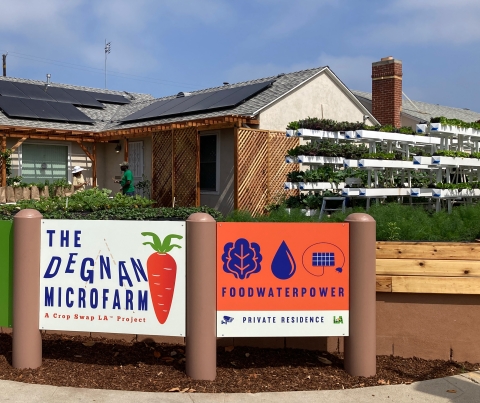As Pollinator Week and Juneteenth converge, we at the U.S. Fish and Wildlife Service want to shine a spotlight on the unique intersection of agriculture and environmental stewardship that’s happening beyond the lands and waters that we manage. As a recent doctoral graduate and a Service Pathways intern, my academic journey has included exploring sustainable farming practices. This led me to microfarming in Los Angeles.
Founded in 2018 by Jamiah Hargins, Crop Swap LA began with a simple yet profound concept: swapping crops among urban gardeners. The initiative has since blossomed into a dynamic urban farming movement that revolutionizes underused spaces into flourishing microfarms and educational hubs, emphasizing the profound relationship between local food production and ecological health. The organization operates several microfarms in South LA, such as the Asante and Degnan Microfarms, which serve as hubs for community engagement and agricultural innovation. Through these microfarms, Crop Swap LA addresses issues of nutrition injustice by providing hyper-local, nutrient-rich foods, supported by pollinators, to areas that are hardest hit by food insecurity. Food insecurity is a condition in which households are uncertain of having, or unable to acquire enough food to meet the needs of their household, sometimes due to lack of money or other resources. This can lead to reduced quality, variety, desirability of diet, and disrupted eating patterns and reduced food intake.
In a recent conversation with Hargins, the passion and strategic foresight driving Crop Swap LA's success were evident. "We started with crop swapping among gardeners and quickly saw the potential to make a bigger impact," Hargins explained. The organization now operates on several fronts - installing microfarms, capturing rainwater and even creating pollinator-friendly spaces like waterfalls and fountains that serve both aesthetic and ecological purposes.
"Our main focus remains on food production," Hargins noted, emphasizing that every plant is like an infant requiring careful nurturing to thrive. This meticulous attention to agricultural detail is evident in the organization's approach to sustainable practices, such as water recycling and the use of organic methods that drastically reduce water usage—a critical consideration in drought-prone Los Angeles. Crop Swap LA focuses on growing a variety of foods that are especially suited to urban microfarm environments. They primarily cultivate leafy greens, herbs and root vegetables like radishes and beets. These crops are selected for their short growth cycles and suitability for small-space farming, making them ideal for their urban agricultural model.
Moreover, Crop Swap LA's educational efforts are key, and provide workshops and hands-on training that demonstrate urban agriculture for community members, from school children to homeowners. These initiatives not only promote local involvement and support, they also enhance community resilience against food insecurity. Despite its commitment to zero waste and composting, the organization has faced difficulties that forced them to discard a significant amount of produce due to a reported fruit fly infestation. Interestingly, the organization has not directly observed these fruit flies themselves.
In addition to its microfarm operations, a standout educational initiative is the South LA Seedling Shuttle, a mobile nursery designed to encourage urban farming and home gardening across the community. This project distributes organic and vegetable seedlings directly to local residents, thereby advancing food sovereignty and supporting the creation of a water-efficient, sustainable food system in underserved areas. This strategic approach not only educates, it also empowers communities by improving access to the tools and knowledge necessary for sustainable living.
The timing of Pollinator Week highlights another dynamic aspect of Crop Swap LA's work: promoting biodiversity through urban agriculture through organic pollinator friendly practices. "Pollinators play a crucial role in our gardens, even if our main focus is on edible plants," Hargins said, pointing out installations that double as habitats for local wildlife, including birds and butterflies. These efforts reflect a broader commitment to creating ecosystems that support both human and environmental health.
As Crop Swap LA prepares to launch its first high school microfarm, the potential for educational and community impact is enormous. The project will integrate food production with agribusiness training, empowering the next generation of urban farmers and environmental stewards.
The organization has grown significantly since its inception, not only expanding its local operations, but also in attracting the attention of celebrities for various initiatives, which highlights the appeal and impact of their microfarming model. The organization actively employs local residents, contributing to job creation in the community. Looking ahead, there are plans to potentially replicate the Crop Swap model in other cities such as Compton, indicating that the sky's the limit for their sustainable agriculture vision.
In a city like Los Angeles, where urban space is at a premium and ecological challenges abound, Crop Swap LA's model offers a blueprint for sustainable urban living. By turning underused land into productive and educational green spaces, Hargins and his team are not just growing food - they are cultivating a greener future.







